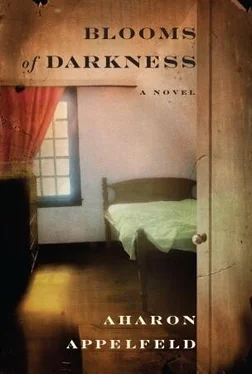That night Hugo dreams that the closet door has opened, and his mother is standing in the doorway. She is wearing the coat she wore when they parted, but now it looks thicker, as though she has filled it with wadding.
“Mama,” he calls out loud.
Hearing his voice, she puts her finger on his mouth and whispers, “I’m also in hiding. I just came to tell you that I think about you all the time. The war is apparently going to be long. Don’t expect me.”
“When approximately will the war be over?” Hugo asks with a trembling voice.
“God knows. Do you feel well? Mariana isn’t mistreating you?”
“I feel fine,” he says, but his mother, for some reason, narrows her shoulders in disappointment and says, “If you feel well, that means I can go away quietly.”
“Don’t go.” He tries to stop her.
“I mustn’t be here. But there is one thing I want to say to you. You know very well that we didn’t observe our religion, but we never denied our Jewishness. The cross you’re wearing, don’t forget, is just camouflage, not faith. If Mariana or I-don’t-know-who tries to make you convert, don’t say anything to them. Do what they tell you to do, but in your heart you have to know: your mother and father, your grandfathers and grandmothers were all Jews, and you’re a Jew, too. It’s not easy to be a Jew. Everybody persecutes you. But that doesn’t make us inferior people. To be a Jew isn’t a mark of excellence, but it’s also not shameful. I wanted to say that to you, so that your spirits won’t fall. Read a chapter or two of the Bible every day. Reading the Bible will strengthen you. That’s all. That’s what I wanted to say to you. I’m glad you feel well. I can go away in peace. The war will apparently be long, don’t expect me,” she says, and goes away.
Hugo wakes up in pain. For many days he has not seen his mother with such clarity. Her face was tired, but her voice was clear and her words were orderly.
Several days ago he had promised himself that he would write down the events of the day in a notebook, but he didn’t keep his promise. His hand refused to open the knapsack and take the writing implements out of it. Why aren’t I writing? Nothing could be easier. I only have to put out my hand and immediately I’ll have a notebook and a fountain pen . Thus Hugo sat and spoke, as though he weren’t talking to himself but to a rebellious animal.
Meanwhile, the days are growing shorter. Cold filters through the cracks and freezes the closet, and the sheepskins don’t warm Hugo. He wears two pairs of pajamas and a woolen hat, but the cold penetrates every corner, and there is no escape from it. At night, when no one is in her room, Mariana opens the door, and the warm air from her room flows into the closet.
Sometimes a vision from the past flashes by, but it quickly dies away. Hugo is afraid that one night the cold and the darkness will form an alliance and kill him, and when the war is over, when his parents come to get him, they will find a frozen corpse.
Mariana knows how cold the closet is at night, and every morning she says, “What can I do? If only I could move the porcelain stove from my room to the closet. You deserve it more than I.” When Mariana says that, he feels that she does indeed love him, and he wants to cry.
But the mornings in her room are very pleasant. The blue stove roars and gives off heat. Mariana rubs his hands and feet and orders the cold to leave his body. Amazingly, the cold does indeed go away and leave him alone.
Sometimes it seems to him that Mariana has assigned an important role to him, because she keeps saying, “You’re a big fellow. You’re one meter and sixty centimeters. You’re like your father and your uncle Sigmund, handsome men, as everyone agreed.”
That talk encourages him, but as to reading or writing, it doesn’t get him that far.
One morning he asks Mariana, “Do you read the Bible?”
“Why do you ask?”
“Mama liked to read from the Bible to me.” He tells her some of what he has on his mind.
“When I was a little girl, I would go to church with my mother every Sunday. Then I loved the church, the hymns and the priest’s sermon. The priest was saintly, and I was in love with him. He apparently sensed my love for him, and every time I came close to him, he would kiss me. Since then lots of water has flowed under the bridge. Since then Mariana has changed a lot. And did they take you to synagogue?”
“No. My parents didn’t go to synagogue.”
“The Jews aren’t religious anymore. Strange. Once they were very religious, and suddenly they stopped believing.” After a few minutes of silence, she says, “Mariana doesn’t like it when they preach morality to her or ask her to confess. Mariana doesn’t like it when they mix into her life. Her parents mixed in more than enough.”
Every day Mariana tells him something about her life, but the hidden part is still greater than the visible part.
When she gets drunk she mixes things up and says, “Your father, Sigmund, would spend hours with me. I loved him. Why don’t the Jews marry Christians? Why are they afraid of the Christians? Mariana’s not afraid of the Jews. On the contrary, she likes the Jews. A Jewish man is decent and knows how to love a woman.”
Hugo knows that in a little while a man will come to her room and scold her for drinking. He has already overheard many quarrels, curses, and blows. When men hit her, she shouted at first, but soon she fell silent, as though she were choking or who knows what. Hugo was very frightened by those sudden silences.
However, there were days when she came back from town happy: she had bought a dress or a pair of shoes. She would apologize for being late, bring him a good meal, hug him, and say, “Too bad I can’t heat the closet.” Hugo would be perplexed and tell her what he had thought about during the day. He wouldn’t talk about his fears.
Some nights bad dreams persecute him, and in the morning he gets up and can’t remember a thing. He has already learned that a dream forgotten in the morning has not disappeared. It is hiding and secretly burrowing. There are forgotten dreams that break out and rise up in the middle of the day.
Some days Hugo’s father and mother are so distant that even in a dream they seem strange to him. His mother tries to approach him nevertheless. He looks at her and is surprised that she doesn’t understand that from such a great distance it’s impossible to draw near. Mama , he calls out, to share her sorrow more than anything. It is clear to him: the distance between them is steadily growing, and in a little while he won’t see her anymore.
It isn’t always that way. There are days when his parents appear to him in a dream and remain with him all day long. They haven’t changed. They are exactly as they were. That they are unchanged is felt every step of the way. For example, the way his mother hugs the coffee cup in the morning, and his father puts a cigarette in her mouth. When he sees that picture, he is certain it will be that way forever. He has to be patient. The war will end soon, and the trumpets of victory will sound all over the city.
One day Mariana comes back from town drunk and angry. Her face is rumpled, and lipstick is smeared on her chin. “What happened?” asks Hugo, rising to his feet.
“People are bastards. Just to steal from Mariana. Just to take from her. Whatever she gives them is never enough. They want more and more, the leeches.”
Hugo doesn’t understand why she is angry, but he isn’t afraid. In the months he has been with her, he has learned her moods. Now he knows that in a little while she will curl up in her bed and sleep till the evening. Sleep is good for her. When she gets up, her face will be peaceful. Darling , she will ask, what did you do? And it would be as if all her anger had never been.
Читать дальше












